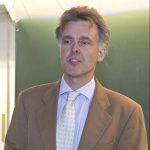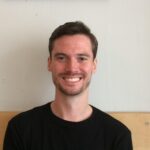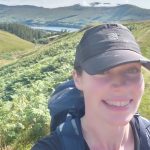These are the scientists involved in the EIP, starting with team leader Prof. Andrew Curtis.
Prof. Andrew Curtis
 Andrew Curtis is the Professor of Mathematical Geoscience at the University of Edinburgh and leads the EIP. He teaches courses on inversion, imaging and ethics, and he researches optics that include inverse theory, imaging methods, uncertainty analysis, experimental design methods, geological prior information, machine learning, expert elicitation and interrogation theory.
Andrew Curtis is the Professor of Mathematical Geoscience at the University of Edinburgh and leads the EIP. He teaches courses on inversion, imaging and ethics, and he researches optics that include inverse theory, imaging methods, uncertainty analysis, experimental design methods, geological prior information, machine learning, expert elicitation and interrogation theory.
Postdoctoral Fellow
Xuebin Zhao
 Xuebin has been working as a post-doc research associate at the University of Edinburgh since January 2024, focusing on seismic imaging and uncertainty assessment. He joined the EIP in November 2019 as a PhD student, supervised by Prof. Andrew Curtis. His PhD topic was Bayesian Inference for Seismic Imaging and Interrogation Problems. He submitted his PhD thesis in November 2023. Before coming here, Xuebin obtained both his Bachelor’s and Master’s degrees in Geophysics at China University of Petroleum-Beijing in 2016 and 2019, respectively.
Xuebin has been working as a post-doc research associate at the University of Edinburgh since January 2024, focusing on seismic imaging and uncertainty assessment. He joined the EIP in November 2019 as a PhD student, supervised by Prof. Andrew Curtis. His PhD topic was Bayesian Inference for Seismic Imaging and Interrogation Problems. He submitted his PhD thesis in November 2023. Before coming here, Xuebin obtained both his Bachelor’s and Master’s degrees in Geophysics at China University of Petroleum-Beijing in 2016 and 2019, respectively.
PhD students
Pratyay Roy
 Pratyay began his PhD at the University of Edinburgh in October 2024, joining the Edinburgh Imaging Project (EIP) under the supervision of Prof. Andrew Curtis and Dr. Xuebin Zhao. His research focuses on Variational Imaging, Uncertainty Assessment, and Integrating Geological Knowledge. He holds a B.Sc. in Physics from West Bengal State University, India, and completed his M.Sc.(Tech.) in Exploration Geophysics with distinction from Banaras Hindu University, India, in 2024. His Master’s thesis explored Integrated Seismic and Gravity Inversion for Subsurface Velocity and Density Modelling of the Deccan Volcanic Province (DVP) near the Barmer-Cambay Basin in India. In 2023, he was among 40 students selected worldwide to attend the SEG/Chevron Student Leadership Symposium at IMAGE’23 in Houston, USA.
Pratyay began his PhD at the University of Edinburgh in October 2024, joining the Edinburgh Imaging Project (EIP) under the supervision of Prof. Andrew Curtis and Dr. Xuebin Zhao. His research focuses on Variational Imaging, Uncertainty Assessment, and Integrating Geological Knowledge. He holds a B.Sc. in Physics from West Bengal State University, India, and completed his M.Sc.(Tech.) in Exploration Geophysics with distinction from Banaras Hindu University, India, in 2024. His Master’s thesis explored Integrated Seismic and Gravity Inversion for Subsurface Velocity and Density Modelling of the Deccan Volcanic Province (DVP) near the Barmer-Cambay Basin in India. In 2023, he was among 40 students selected worldwide to attend the SEG/Chevron Student Leadership Symposium at IMAGE’23 in Houston, USA.
Zhen Zhang
 Zhen Zhang is currently pursuing a PhD in the Edinburgh Imaging Project (EIP) at the University of Edinburgh, which he began in March 2024. Under the supervision of Prof. Andrew Curtis and Dr. Xuebin Zhao, his research focuses on variational imaging, uncertainty assessment, and the interrogation of subsurface CO₂ storage reservoirs, contributing to advancements in reservoir characterization and environmental safety. Before joining the University of Edinburgh, Zhen obtained his Master’s degree in Energy Resource and Petroleum Engineering at King Abdullah University of Science and Technology (KAUST), where his research centered on reservoir simulation, geostatistics, and machine learning. He earned his Bachelor’s degree at the China University of Petroleum (East China), where he also spent half a year at the Colorado School of Mines, focusing on well connectivity determination.
Zhen Zhang is currently pursuing a PhD in the Edinburgh Imaging Project (EIP) at the University of Edinburgh, which he began in March 2024. Under the supervision of Prof. Andrew Curtis and Dr. Xuebin Zhao, his research focuses on variational imaging, uncertainty assessment, and the interrogation of subsurface CO₂ storage reservoirs, contributing to advancements in reservoir characterization and environmental safety. Before joining the University of Edinburgh, Zhen obtained his Master’s degree in Energy Resource and Petroleum Engineering at King Abdullah University of Science and Technology (KAUST), where his research centered on reservoir simulation, geostatistics, and machine learning. He earned his Bachelor’s degree at the China University of Petroleum (East China), where he also spent half a year at the Colorado School of Mines, focusing on well connectivity determination.
Contributing Partners
David Fairweather
 David started his PhD in September 2020, under the working title of ‘Using submarine telecommunications cables as seismometers‘. This research investigates the feasibility of making seismic measurements using optical interferometric methods on existing intercontinental oceanic cables. David received his BSc in Geophysics and Meteorology at the University of Edinburgh before staying on for the PhD supervised by Prof. Andrew Curtis and in collaboration with the National Physical Laboratory.
David started his PhD in September 2020, under the working title of ‘Using submarine telecommunications cables as seismometers‘. This research investigates the feasibility of making seismic measurements using optical interferometric methods on existing intercontinental oceanic cables. David received his BSc in Geophysics and Meteorology at the University of Edinburgh before staying on for the PhD supervised by Prof. Andrew Curtis and in collaboration with the National Physical Laboratory.
Katherine Tant

Corinna Roy
Corinna is a postdoctoral researcher at the University of Leeds, currently working on a project jointly with Andrew Curtis, and with Brian Baptie at the British Geological Survey focussed on devising methods to better assess uncertainties on earthquake magnitudes in operations that induce seismicity.
Richard Delf
Richard is a PhD student working on imaging and interpretation methods for ground penetrating radar data on ice for glaciological purposes.
Eva Dokter
Eva is a PhD student at the University of Edinburgh with Prof. Andrew Curtis working to develop novel methods of velocity analysis using Marchenko methods.
Helen Ockenden
Helen is a PhD student working on imaging and interpretation methods for ground penetrating radar data on ice for glaciological purposes.
Lou Parkes
Lou Parkes is a PhD student at the University of Edinburgh researching the use of passive seismic methods to investigate seismic anisotropy. She is funded by NERC through the E3 DTP, supervised by Mark Chapman and Andrew Curtis and has links with the CHIMNEY project with researchers at the University of Southampton. Previous to starting her PhD in 2018, she gained her BSc in Physics from the University of Birmingham and MSc in Exploration Geophysics from the University of Leeds.
Former members
The EIP is built up of different phases. The latest, phase 4, commenced in September 2023. Below the people who finished their work within the previous phases are listed.
EIP Phase 3
-
- Xin Zhang: PhD, then PostDoc – Nonlinear imaging and uncertainty analysis. Now at China University of Geosciences (Beijing), China.
- Hugo Bloem: PhD – Using machine learning to inject geological prior information into tomographic imaging. Now at the Earth Rover Program, U.K.
- Dominic Cummings: PhD – Marchenko, Lipmann-Schwinger and waveform inversion.
EIP Phase 2
-
- Carlos Alberto da Costa Filho: PhD, then PostDoc – Imaging and demultiple using Marchenko methods. Now a research scientist in CGG, Brazil.
- Claire Allmark: PhD – Surface wave interfermetry and attenuation tomography. Now at an acoustic company, U.K.
- Satyan Singh: PostDoc – Migration-based imaging methods and neural network inversion. Now at CGG, U.K.
- Stephanie Earp: PhD – Marchenko methods and Machine learning. Now founder of Optic Earth.
EIP Phase 1
-
- Giovanni Meles: – PostDoc – Wavefield scattering and interferometry. Now a PostDoc at TU Delft, the Netherlands.
- Erica Galetti: PhD – Ambient noise tomography. Moved on to a number of postdoc positions in Edinburgh.
- Matteo Ravasi: PhD – Imaging beyond primaries. Now a research scientist at Equinor, Norway.
- Katrin Löer: PhD – Scattering methods and multiples. Now an academic in Bochum.
- Martin Martin: PhD deconvolutional interferometry
- Sara Rawlinson: PhD deconvolutional interferometry. Now a scientist in GNS Science, New Zealand
